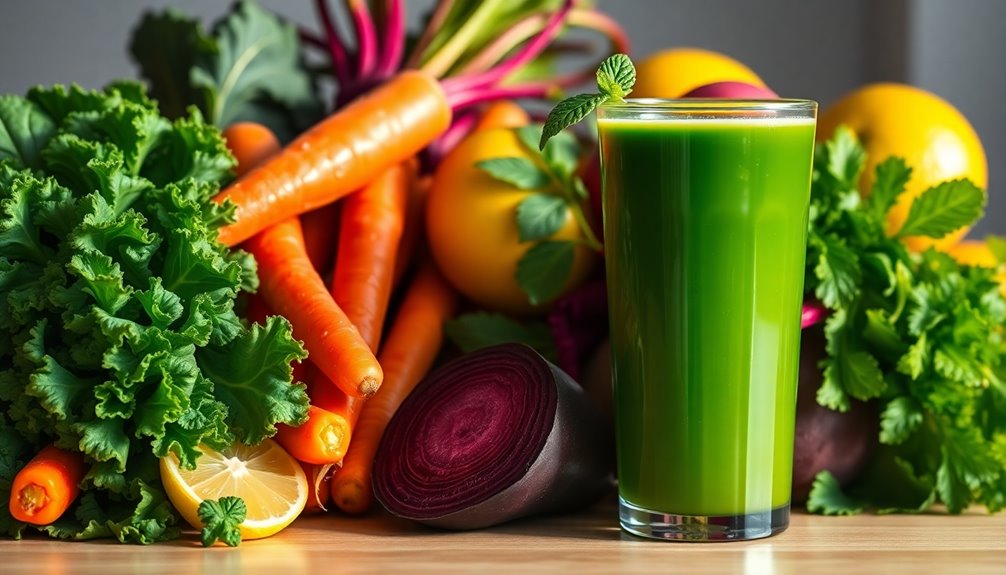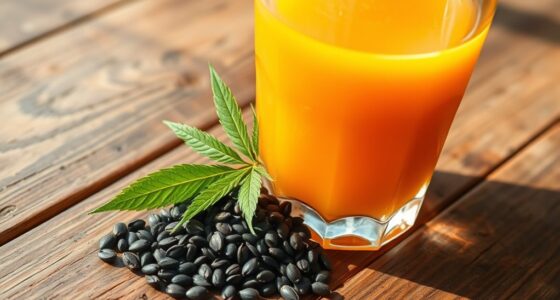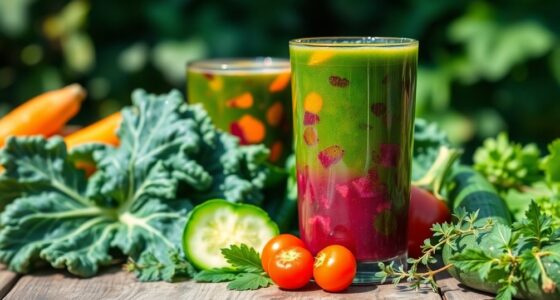Juicing can be a game changer for weight loss by providing essential nutrients while keeping calories low—most vegetable juices average about 65 calories per serving! By incorporating leafy greens, citrus fruits, and nutrient-dense ingredients, you'll boost your vitamin intake without excess sugars. Just remember, balancing juice with whole foods ensures you get enough fiber and satiety. Want to discover more tips and strategies to maximize your juicing benefits? Keep going to uncover the secrets!
Key Takeaways
- Juicing creates a calorie deficit, aiding short-term weight loss by replacing unhealthy foods with nutrient-dense options rich in vitamins and minerals.
- Incorporating high-fiber ingredients like apples and carrots maximizes health benefits, promoting satiety and digestive health alongside juicing.
- Using leafy greens in juices boosts nutrient intake while keeping calories low, supporting sustained energy levels without causing sugar spikes.
- Cold-pressed juices concentrate nutrients but lack fiber; balancing juices with whole foods ensures comprehensive nutrient intake and helps prevent deficiencies.
- Rotating a variety of fruits and vegetables in juices promotes a broader spectrum of vitamins and minerals, enhancing overall health benefits.
Understanding Calorie and Nutrient Content in Juices
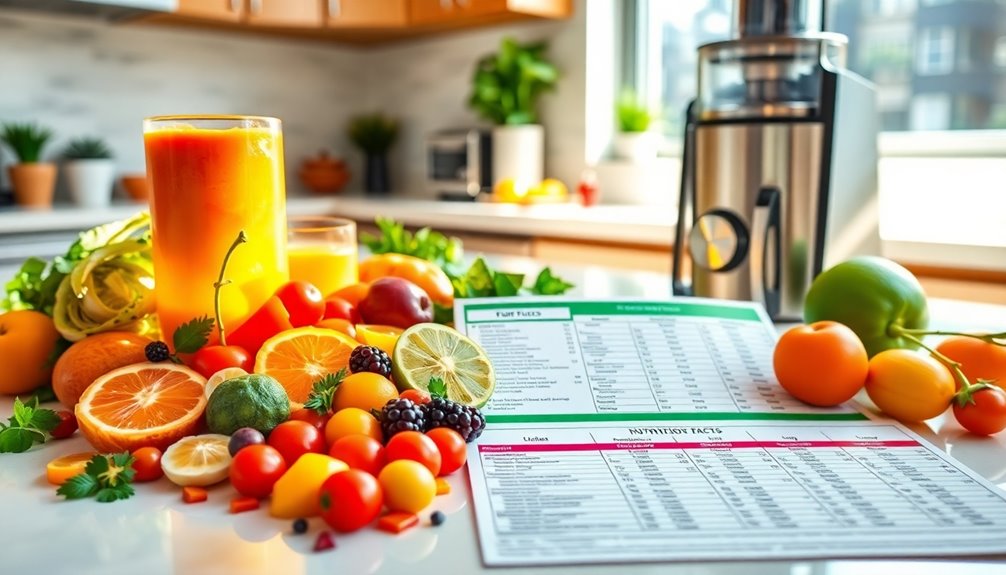
When you're considering juicing for weight loss, it's essential to understand the calorie and nutrient content of various juices. For instance, apple juice packs 114 calories per cup, while grapefruit juice is lower at 96 calories. Keep in mind that most fruit juices are high in sugar; mango juice contains 25.3g of sugar. On the other hand, vegetable juices offer a lighter option, averaging around 65 calories. Citrus juices, like orange juice, not only provide 112 calories but are also rich in vitamin C and potassium. However, many juices lack fiber, which is crucial for satiety. Additionally, cranberry juice is notable for its relatively high vitamin C content, with 76 mg per cup, making it a nutritious choice for your juicing regimen. Including chia seeds in your diet can enhance your fiber intake and contribute to greater satiety, supporting your weight loss goals. Balancing your juice intake with whole foods can ensure you get the nutrients needed for effective weight loss.
Exploring Weight Loss Mechanisms Through Juicing
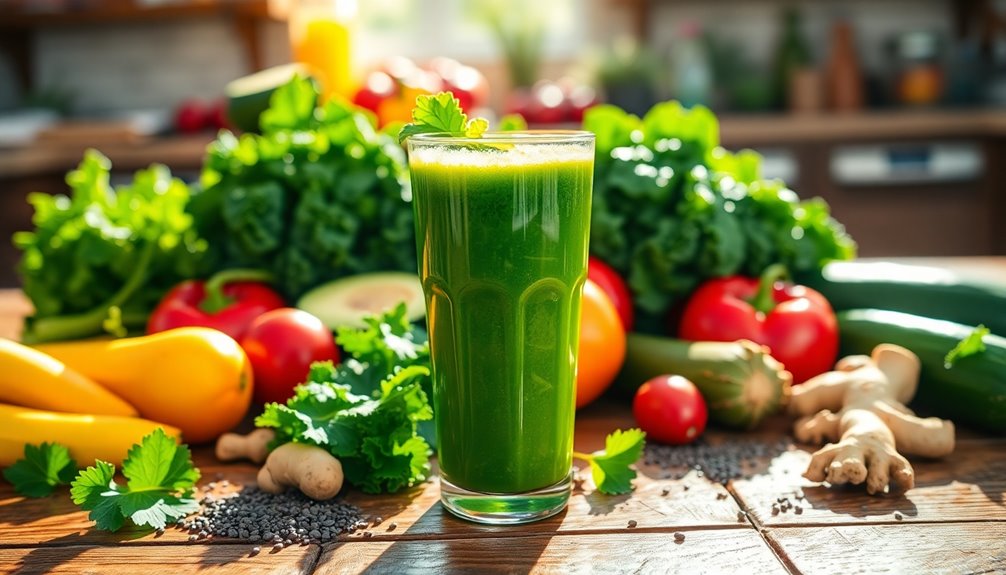
Juicing can seem like an appealing method for weight loss, but understanding its mechanisms is vital for making informed choices. While you might experience short-term weight loss due to a calorie deficit, it's essential to recognize that this approach isn't sustainable. Juicing can help displace less healthy foods and increase your intake of vitamins and minerals, yet it also lacks fiber, which can lead to rapid sugar absorption and potential weight gain. Furthermore, juicing may increase the risk of nutritional deficiencies and muscle loss, as your body may turn to muscle for energy. In addition, the inclusion of low-impact exercises along with juicing can enhance weight loss efforts while minimizing the risk of joint strain.
Nutritional Benefits of Fresh Juices
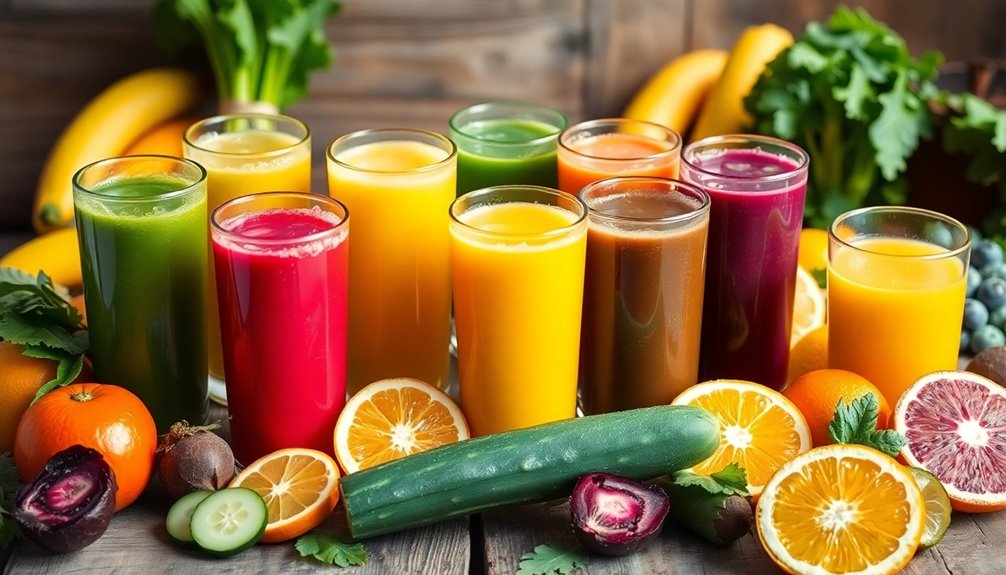
Fresh juices offer a wealth of nutritional benefits that can enhance your overall health.
They're packed with soluble fiber, which supports digestive health and helps regulate blood sugar levels. This fiber promotes the growth of good gut bacteria while lowering cholesterol. Additionally, more fiber in fresh juices can help slow the transit of food through the digestive tract, leading to improved satiety. Moreover, juices rich in vitamins A, C, and K can provide essential nutrients that support overall health.
Fresh juices also boast powerful antioxidants, protecting your cells from damage and reducing inflammation. Juices like beet and pomegranate are especially rich in these protective compounds. The antioxidants in fresh juices can further help reduce inflammation, which is beneficial for overall wellness.
Plus, they provide hydration, crucial for energy production and metabolism. With natural sugars like fructose, fresh juices can help normalize blood sugar levels without the crash associated with processed sugars.
Incorporating these vibrant juices into your diet can significantly support your weight loss journey while boosting your health.
Common Ingredients for Effective Juicing
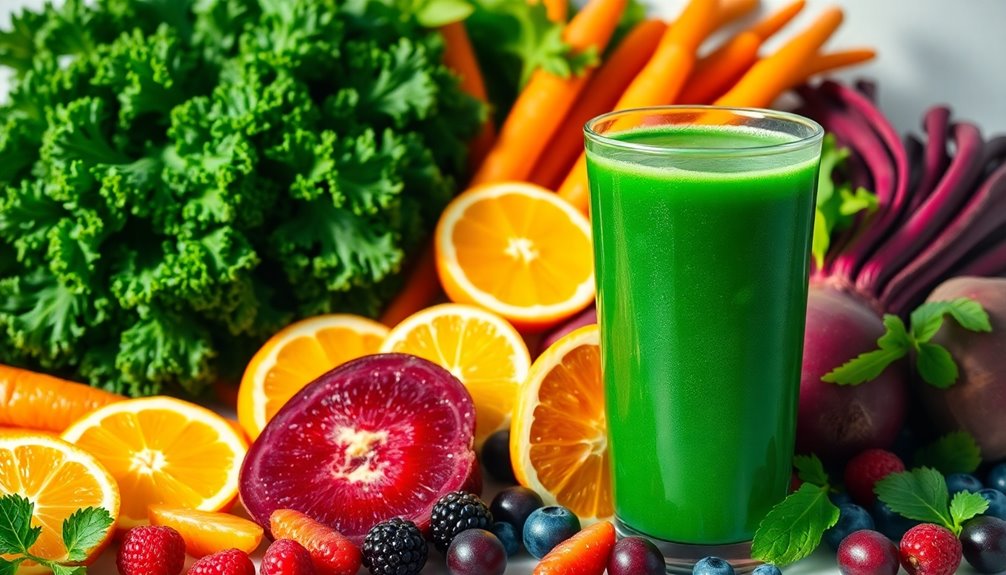
Incorporating fresh juices into your diet isn't just about the benefits they provide; it's also about knowing which ingredients pack the most nutritional punch.
Leafy greens like spinach and kale are fantastic for their vitamins and antioxidants, while cruciferous vegetables like broccoli and cabbage offer fiber and essential nutrients. Juicing supports cardiovascular health by decreasing cholesterol levels, making these greens even more beneficial for heart health. Additionally, leafy greens are known to improve blood circulation, further enhancing overall wellness.
Don't forget citrus fruits—lemons and oranges not only boost flavor but are also rich in vitamin C.
Adding herbs like ginger and mint can enhance your juice with anti-inflammatory and digestive benefits.
Lastly, low-calorie vegetables such as cucumbers and celery keep your juices light while providing hydration.
Health Considerations When Juicing
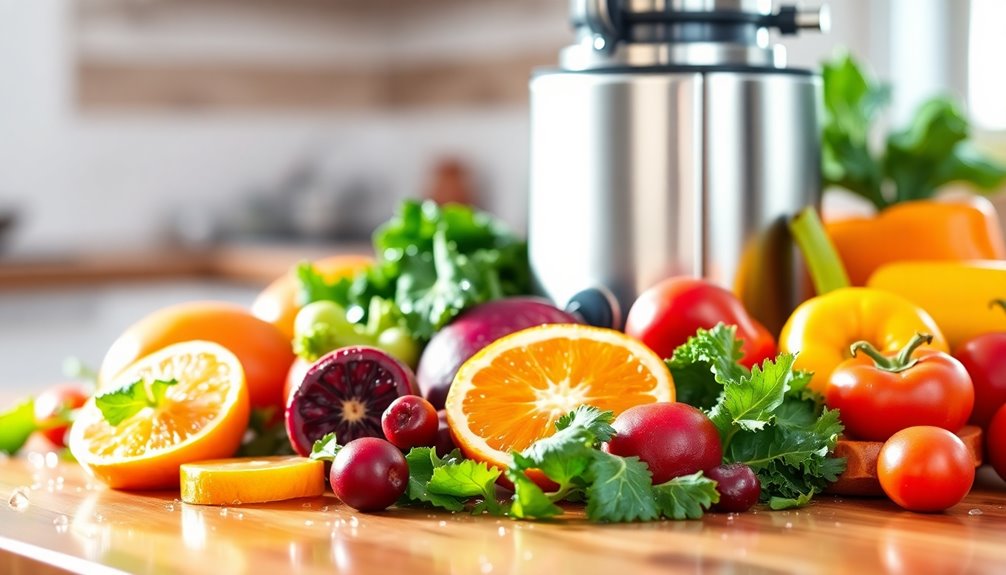
While many people turn to juicing for its health benefits, it's crucial to consider the potential risks and how it fits into your overall nutrition. Juicing can lead to fiber loss, which is essential for heart health and blood sugar regulation. The high sugar content in juices may cause blood sugar spikes, particularly concerning for those managing diabetes. Additionally, cold-pressed juicing can concentrate nutrients, but it also removes fiber, which is beneficial for health. Although it offers convenience, juicing shouldn't replace whole foods; they provide vital nutrients and fiber. In contrast, the raw food diet emphasizes whole, unprocessed foods that can help mitigate some of the risks associated with juicing. Extended juice cleanses can harm your kidneys due to high oxalate levels, and fresh juice can spoil quickly, posing a risk for bacterial contamination. Always consult a healthcare professional before starting a juicing regimen, especially if you have chronic health conditions.
Practical Tips for Successful Juicing
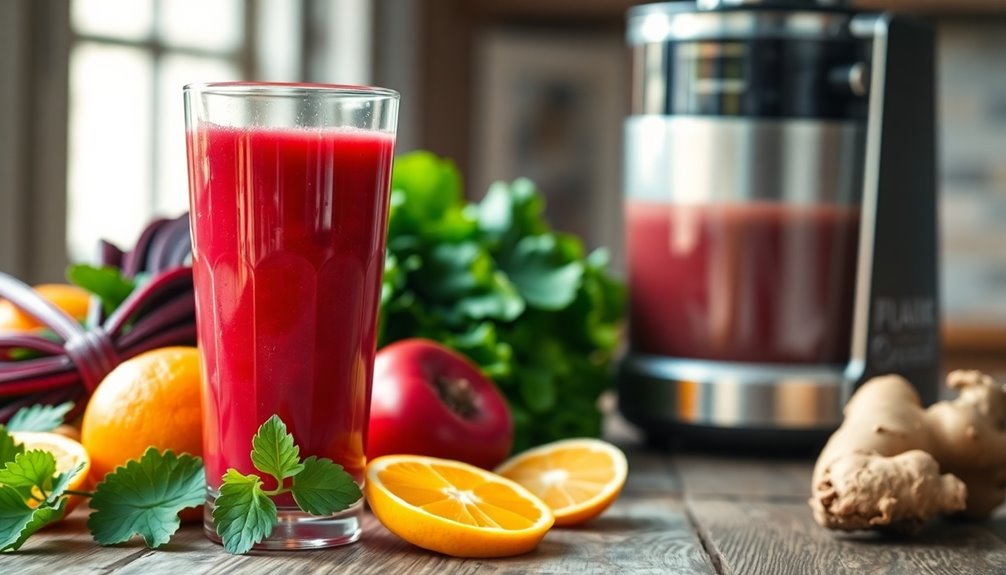
To achieve successful juicing, it's essential to adopt practical strategies that streamline the process and enhance the quality of your juice.
Start by choosing the right equipment, like cold-press juicers to preserve nutrients and wide chute juicers to save prep time. Use non-reactive containers for storage, and consider pulp bin liners for easy cleanup.
Buy ingredients in bulk to save money, and prep your produce right after shopping. Pre-chop and label ingredients for quick access. Remember to choose the best juicing machine to ensure that you maximize nutrient retention and freshness.
Balance flavors by including sweet fruits and tart ingredients, while maximizing juice yield with cucumbers or celery.
Finally, drink your juice soon after making it, and store it in airtight containers to prevent oxidation.
These tips will help you enjoy fresh, nutritious juice daily!
The Role of Fiber and Pulp in Homemade Juices
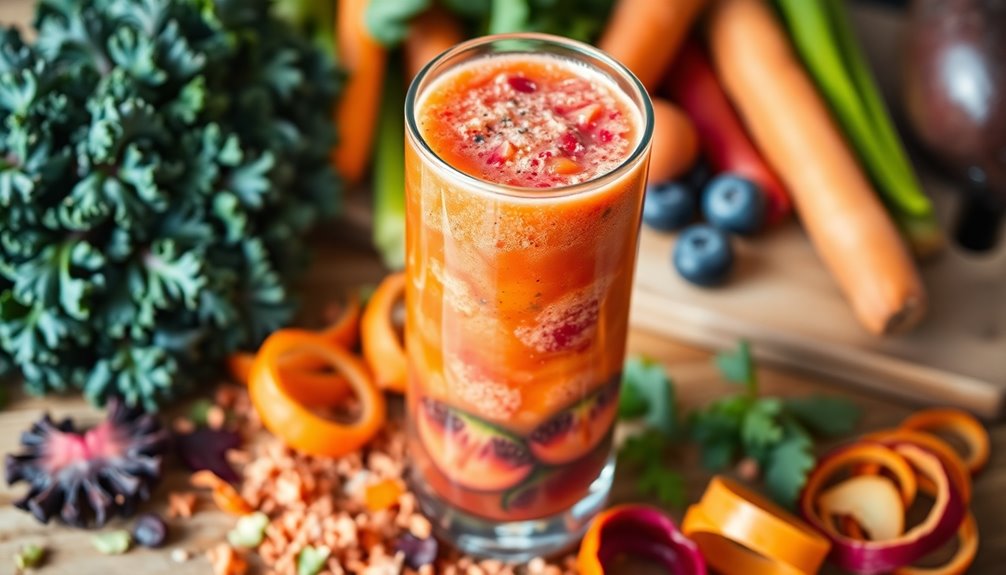
Fiber and pulp play a vital role in homemade juices, enhancing both their nutritional value and health benefits.
Soluble fiber helps slow digestion and stabilize blood sugar, while insoluble fiber adds bulk to your stool, promoting gut health. By incorporating pulp back into your juice, you increase fiber intake, which can help you feel fuller and support weight management. Using a slow juicer retains more nutrients and some fiber compared to high-speed options, making it essential to maximize nutrient retention. Additionally, including chia seeds in your juices can further boost fiber content and support weight loss efforts. You can also reuse pulp in smoothies for added texture and nutrients.
Opt for high-fiber ingredients like apples and carrots to maximize the benefits. Ultimately, balancing fiber and pulp can supercharge your juicing experience and boost your overall health.
Balancing Juicing With a Healthy Diet
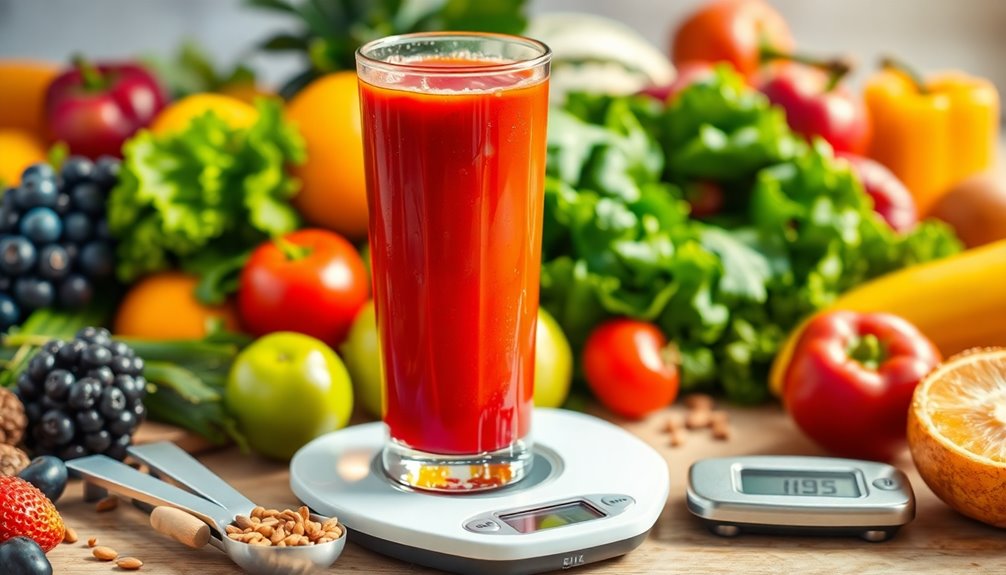
Juicing can be a fantastic way to increase your intake of vitamins and minerals, but it shouldn't replace whole foods in your diet. Instead, think of juicing as a complementary approach that boosts your nutrient variety and convenience. Incorporating leafy greens like kale and spinach in your juices provides sustained energy and enhances mental clarity without causing energy spikes. For effective weight management, combine your juices with whole grains, lean proteins, and healthy fats. This balanced strategy ensures you receive essential nutrients while supporting overall health. Additionally, incorporating a wide range of fruits and vegetables in your juices helps ensure a spectrum of vitamins and minerals. Including ingredients like tropical fruits can elevate the flavor and nutritional value of your drinks. Remember to rotate your ingredients for a wider range of nutrients and opt for organic produce when possible, maximizing the nutritional quality of your juices and promoting a holistic lifestyle.
Frequently Asked Questions
Can Juicing Replace All Meals for Weight Loss?
Juicing can't replace all your meals for weight loss. While it might help you shed some pounds initially, it lacks essential nutrients like fiber and protein that keep you full and healthy.
Relying solely on juices can lead to nutrient deficiencies and muscle loss. Instead, think of juicing as a supplement to a balanced diet, combining it with whole foods and exercise for sustainable weight management.
Moderation is key!
How Often Should I Juice for Optimal Results?
If you want to feel like a superhero, juicing regularly could be your secret weapon!
For optimal results, consider a 3-5 day juice fast once or twice a month for weight loss. Alternatively, try incorporating juice into one meal daily to boost gut health.
What Are the Best Times of Day to Juice?
The best times to juice depend on your daily routine. Early morning juicing jumpstarts your metabolism and energy.
Pre-workout juices fuel your exercise, while post-workout options help with recovery.
For lunch, a juice can replace a meal, providing nutrients and combating fatigue.
In the evening, juices can curb appetite before dinner and promote relaxation.
Lastly, consider overnight juicing for hydration and convenience, ensuring you're ready for a nutritious start the next day.
Can I Juice With a Blender Instead of a Juicer?
Can you really juice with a blender instead of a juicer? Absolutely!
While blenders don't extract juice in the same way, they can create a juice-like consistency if you blend ingredients with some water and strain out the pulp.
You'll retain the fiber, which can help you feel fuller longer. Just remember, it might require more prep work and cleanup, but it's a cost-effective and versatile option for your kitchen!
Are There Specific Fruits to Avoid While Juicing?
When you're juicing, it's smart to avoid high-sugar fruits like mangoes and pineapples, as they can spike your blood sugar.
Also, limit oxalate-rich fruits like strawberries and kiwis if you have kidney concerns.
Stick to veggie-dominant juices to reduce sugar content and enhance nutrients.
Remember, juicing shouldn't replace whole foods, so balance is key for a healthier approach.
Always consult a healthcare professional for personalized advice.
Conclusion
In the journey of weight loss, juicing can be your unexpected ally. Just as you might stumble upon a hidden gem in your favorite café, discovering the right juicing ingredients can supercharge your health. By harnessing the nutritional benefits and balancing them with a wholesome diet, you’ll find that shedding pounds doesn’t have to feel like a chore. So grab those fruits and veggies, and you might just juice your way to a healthier you—who knew weight loss could be this delicious? Moreover, incorporating a variety of colorful fruits and vegetables into your juices not only enhances flavor but also ensures you receive a broad spectrum of vitamins and minerals vital for your body’s functions. As you explore different combinations, you’ll discover that juicing for weight loss benefits can also satisfy your taste buds and keep your energy levels high throughout the day. Remember, the key is to combine these vibrant ingredients in a way that complements your overall dietary goals, making your weight loss journey both enjoyable and effective.
Cindy thoroughly researches juicing trends, techniques, and recipes to provide readers with practical advice and inspiration. Her writing style is accessible, engaging, and designed to make complex concepts easy to understand. Cindy’s dedication to promoting the advantages of juicing shines through her work, empowering readers to make positive changes in their lives through the simple act of juicing.

